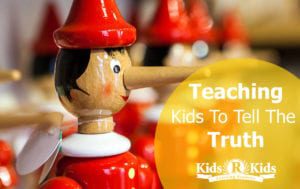“Liar, liar, pants on fire!” You probably said this to your friends or your siblings when you were little. When it’s your own child who is lying, it’s a bigger deal. Parents understandably get very concerned, even panicky, about lying. But take heart, it doesn’t mean your kids are destined for a life of crime. Fortunately, it’s something we can fix with a few adjustments to our parenting style.

First, let’s take a look at why kids lie. Younger kids love a reaction, so they’ll tell outlandish stories to impress you. For those tall tales, the best response is to affirm the feeling with a comment such as, “I bet you wish you could jump to the top of that building. That would be cool!” Or, simply ask, “Is that a real story or a pretend story?”
Another reason kids lie is to avoid a punishment or an unpleasant outcome. It’s a perfectly normal response. It’s hard for a kid to be honest when she knows she may face punishment or humiliation. And of course, kids lie to avoid losing favor in your eyes. The last thing they want to do is disappoint you. They’d rather lie than have you think less of them for something they did (or didn’t do).
The way we respond to those lies will determine, in large part, whether or not they continue. If parents respond with swift and stern punishment, it creates a vicious cycle. The more kids are punished for lying, the less likely they are to tell the truth in the future.
Instead of doling out punishment for every fib, let’s create a safe environment for the truth with these important strategies:
- Be aware of how you respond to misbehavior in general. If your kids are worried about being punished, yelled at, or made to feel stupid every time they mess up, they won’t feel safe telling you the truth. When kids misbehave, practice using a calm voice and focus on solutions that will solve the problem instead of assigning blame.
- Allow your child to save face. Don’t set up your child to fib by asking questions to which you already know the answer. Instead of asking, “Did you clean up your toys?” try, “What are your plans for cleaning up the toys?” This way, if he hasn’t even thought about tidying up the mess, he can save face by focusing on a plan of action rather than lying about it.
- Focus on the feeling. When your child is dishonest, try to understand what made him feel that he couldn’t be honest with you. Instead of calling him out about the lie, try, “That sounds like a bit of a story to me. I wonder if I made you feel afraid to tell me the truth. Let’s talk about that.” With that approach, you’ll be more likely to get the honesty you’re looking for, as well as create a safe environment for honesty in the future.
By following these guidelines, you’ll soon notice a sharp decline in the lies your kids tell. You’ll also show them that no matter the situation, everyone benefits from the truth.